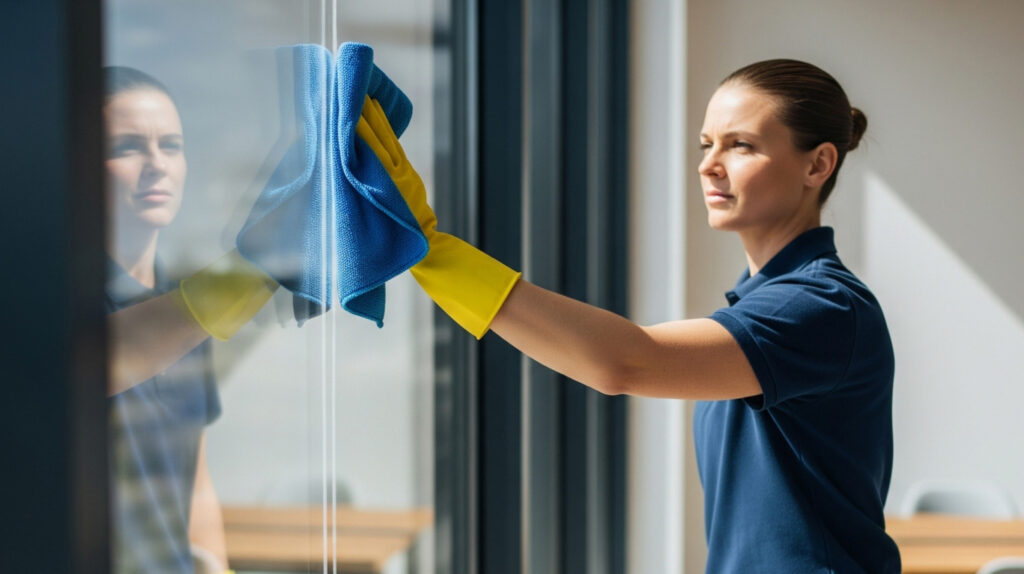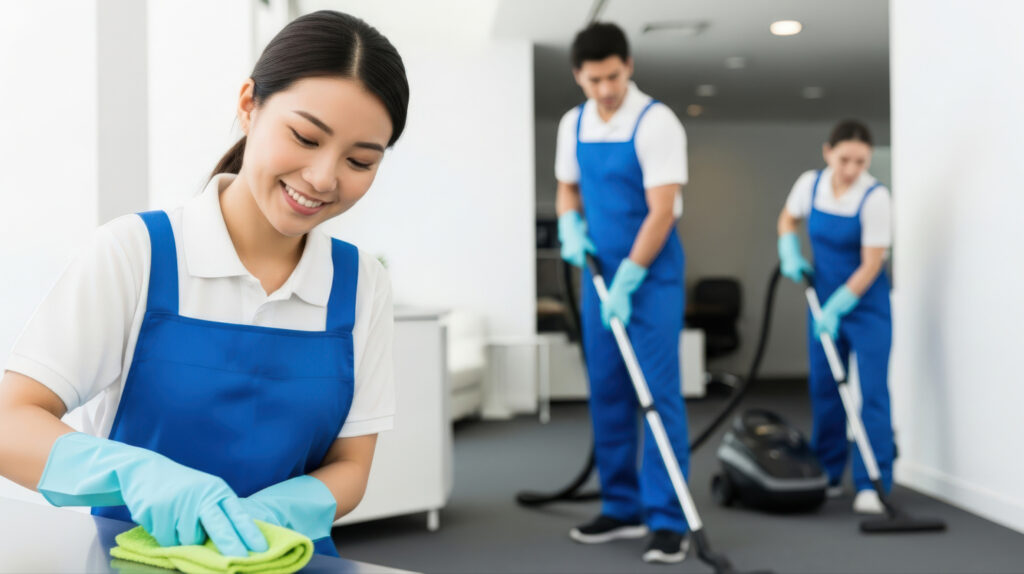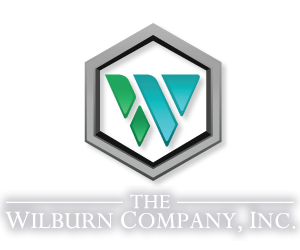
A slip-and-fall lawsuit. A failed health inspection. Tenants who won’t renew their leases.
Walk into any property management office and you’ll hear at least one of these concerns mentioned. Cleaning now affects far more than how a space looks. Spaces need to be clean enough to protect health, pass inspections, and justify what tenants pay. The stakes keep getting higher, which pushes facility teams to rethink what “clean” needs to accomplish.
That shift has put professional cleaning at the center of building operations, though not the basic janitorial work most people picture. Real professional cleaning strengthens your building’s safety protocols, supports sustainability commitments, and protects the long-term value of your property.
Understanding how professional cleaning differs from basic approaches helps you choose services that support your building’s safety, longevity, and day-to-day use.
What Is Professional Cleaning?
Professional cleaning means more than someone with a mop and bucket. It relies on trained teams who follow industry standards, use commercial-grade equipment, and document the results. Those practices show up in fewer sick days, smoother inspections, and spaces that stay clean longer.
Informal cleaning tends to center on appearances, but professional services focus on health, safety, and compliance requirements.
How Professional Cleaning Differs
These differences show up clearly in how professional teams approach each task. Every bathroom fixture, every lobby window, every conference room table gets the right product and method. Nothing gets missed or treated wrong.
Industry certifications and standards shape how these services are delivered. Some companies follow strict green cleaning protocols that limit chemical use, and others operate under OSHA rules that support workplace safety.
Training and Protocols for Secure Environments
High-security buildings require cleaning teams with specialized training. Staff must follow secure access rules and protect sensitive information inside regulated areas.
Beyond secure-facility protocols, professional providers offer a range of service options.
- Office cleaning
- Janitorial services
- Carpet cleaning
- Specialty cleaning for medical or data centers
- Deep cleaning for seasonal needs

Measurable Outcomes and Accountability
Providers document their work through regular inspections and digital reports, with a dedicated team responsible for maintaining accountability and meeting standards. This gives you clear records for audits or compliance needs.
Why Professional Cleaning Matters for Commercial Properties
Professional cleaning removes dust, allergens, and contaminants that affect health. Consider this: University of Arizona researchers found that office desks harbor 400 times more bacteria than a typical toilet seat. That’s the level of contamination people touch all day without thinking about it.
This supports a work environment where tenants and employees can stay healthier and more focused. But health isn’t the only concern. Your building itself needs protection.
Asset Protection and Value
Consistent cleaning preserves your property’s physical assets. Grit and debris grind down flooring, uncleaned fixtures corrode faster, and neglected finishes stain permanently. Catching these issues through regular maintenance costs far less than emergency replacements.
Your property holds its value and stays competitive when prospective tenants compare their options. And what do those tenants notice first?
Tenant Satisfaction and Retention
Tenants notice cleanliness immediately. A lobby with streaked glass sends a very different signal than fresh restrooms and dust-free workspaces.
These visible details signal whether a building is managed with care or just maintained at minimum standards, and they often shape both tenant satisfaction and liability exposure.
Key Benefits of Professional Cleaning Services
Professional cleaning does more than keep floors shiny. The right service builds systems that prevent problems, adapt to your schedule, and deliver results you can measure.
Quality Assurance and Consistency
You shouldn’t have to guess whether your building got cleaned properly last night. Providers use checklists and inspections to keep results consistent across every shift and every cleaner.
This structure maintains dependable cleanliness and makes it easier to spot problems before they escalate. Consistency also matters when you’re trying to improve indoor air quality.
Green Cleaning and Environmental Responsibility
Cleaner air feels better. It also makes people sharper. Harvard University researchers found that workers in spaces with higher air quality performed better on cognitive tasks, with improvements reaching 61 percent. Green cleaning products reduce chemical exposure while delivering these measurable benefits.

Security and Specialized Protocols
For government buildings or facilities with sensitive information, secure cleaning is essential. Teams trained for secure environments follow strict access rules and confidentiality protocols.
They know which areas require escorts, which documents can’t be moved, and how to work around classified materials without exposure.
This level of training protects both your data and your compliance status.
Emergency Response and Business Continuity
Unexpected events like spills or water damage can shut down operations. Emergency crews respond quickly to contain damage and restore access.
Beyond emergencies, professional providers adapt as your needs change. They shift schedules, adjust service levels, and update protocols. This flexibility pays off in concrete terms.
Jones Lang LaSalle analyzed 14 million square feet of commercial space and found that preventive maintenance delivers a 545 percent return on investment over 25 years.
Regular cleaning prevents the costly emergency fixes that drain budgets. But prevention only works when the service actually fits your building.
Adaptability for Complex Facility Needs
Every building has unique requirements. A professional cleaning company can match its services to your specific facility, whether it’s a corporate office, medical clinic, or government site.
Schedules shift when occupancy changes, service levels adjust during slow seasons, and protocols update when regulations change. This flexibility keeps your cleaning program aligned with what you actually need.
What to Expect from a Professional Cleaning Service
Professional cleaning services follow a structured process. They start by understanding your facility’s specific needs, then build a plan that addresses them consistently.
Standard and Specialized Offerings
A professional cleaning company provides a mix of routine and specialized services.
- Routine cleaning includes daily tasks like vacuuming, dusting, and restroom sanitation.
- Deep cleaning focuses on intensive tasks like carpet cleaning or hard floor restoration.
- Janitorial services offer continuous upkeep for high-traffic facilities.
The mix depends on your facility type and traffic patterns. A medical center needs different protocols than a corporate office, and both differ from a government building with clearance requirements.
The Process of Professional Cleaning
It starts with a thorough facility assessment. What gets heavy use? Which areas have special requirements? Where do current gaps exist? From there, the provider develops a cleaning plan specific to your building.
Routine inspections and progress tracking maintain quality standards and accountability. Staff members receive training on safety protocols, equipment use, and the techniques your facility requires.
Communication and Customization
Direct communication keeps the service running smoothly. You get a dedicated point of contact who handles updates, answers questions, and manages scheduling changes. Need extra service before a big client visit? Want to reduce frequency during a slow quarter? Your contact adjusts the plan to match what’s happening in your building.
Technology and Innovation
Modern cleaning services use technology to improve results and accountability. Digital checklists track which tasks were completed and when. Photo documentation shows before-and-after conditions.
Some providers use sensor data to identify high-traffic areas that need more frequent attention. These tools create transparency and help you verify that the work matches what you’re paying for.
Understanding the Cost of Professional Cleaning
Most facility managers receive multiple cleaning proposals with wildly different prices. Understanding what drives those differences helps you evaluate them honestly instead of just picking the lowest number.
Key Pricing Factors
Three elements drive most of the cost variation: your facility’s size, the scope of services, and cleaning frequency. But those aren’t the only factors.
Facilities requiring specialized protocols like secure access or green certification carry higher costs because they demand additional training, clearances, and specific products.
Once you understand what affects the total cost, you’ll see those factors reflected in how companies structure their pricing.
Common Pricing Models
Commercial cleaning companies usually follow a few standard pricing methods. Some charge per square foot, which works well for large spaces. Others offer a fixed-rate contract for ongoing service, while project-based pricing applies to one-time work such as deep cleaning or post-construction cleanup.
Value Beyond the Price Tag
A cheap cleaning service that misses problems costs more in the long run. Professional cleaning preserves property value by preventing costly repairs, reducing compliance risks, and keeping tenants satisfied enough to renew.
Regular, scheduled cleaning prevents the expensive surprises that come from deferred maintenance.
When reviewing proposals, look for specific details: which areas get cleaned, how often, and by what method. Reliable providers break down exactly what you’re paying for and show how each service protects your building’s assets and reduces operational risk.
Evaluating Your Facility’s Cleaning Needs
Professional cleaning delivers the most measurable benefits in facilities where safety, compliance, or security standards matter. Government buildings, medical centers, REIT properties, and corporate offices fit that profile.
But any facility manager dealing with compliance requirements, tenant expectations, or liability concerns should evaluate whether their current program measures up.
How to Assess Your Facility’s Needs
Use this checklist to evaluate your current cleaning program.
- Are high-touch surfaces cleaned and disinfected on a documented schedule?
- Does your provider use green cleaning products that meet third-party certification standards?
- Has your cleaning staff received training for security protocols and compliance requirements specific to your facility type?
- Do you have clear communication channels and documentation for service gaps or concerns?
- Are your cleaning procedures compliant with health and safety standards, including OSHA regulations for safety and employee training?
Once you’ve identified what’s working and what isn’t, you can adjust your cleaning schedule to match how your facility actually gets used.
Planning and Frequency
Cleaning frequency should reflect how your building is used and how many people pass through it each day. Lobbies, restrooms, and breakrooms in high-occupancy buildings typically need daily service.
Conference rooms and private offices may only require service two or three times per week. Storage areas and rarely used spaces can often go longer between cleanings.
If your checklist revealed gaps in coverage, inconsistent results, or missing documentation, your current program needs work. A professional cleaning provider can assess your facility and build a plan that addresses those specific issues.
Work with a Provider Who Understands Your Requirements
Your facility’s cleaning program either prevents problems or creates them. The difference comes down to the partner you choose. Getting those results requires a partner with experience in your type of facility and proven cleaning standards.
That’s where we come in. Wilburn serves government facilities, corporate offices, and REITs with GS-42 certified green cleaning (the federal standard for sustainable cleaning) and secure protocols designed for sensitive environments. We maintain consistent quality through regular inspections, digital documentation, and direct accountability to your facility manager.
Request a facility assessment to see where your current program can improve, or contact us to discuss your specific requirements. We’ll help you build a cleaning program that protects your property, satisfies your tenants, and meets your compliance requirements.
Frequently Asked Questions About Professional Cleaning
What exactly does “professional cleaning” mean and what does it include?
Professional cleaning means trained teams who follow industry standards instead of just making spaces look tidy. Services include daily janitorial work, deep cleaning, carpet care, and disinfection. Everything gets documented so you have proof the work was done and can track results over time.
What are the benefits of hiring a professional cleaning service for commercial facilities?
The main benefits are a healthier environment, dependable results, and confidence that your facility meets safety and compliance standards. Professional cleaning also protects long-term property value and provides quick support in urgent situations.
How much does professional cleaning typically cost and what factors affect the price?
Pricing varies by building size, service frequency, and scope of work. Most commercial providers charge per square foot for ongoing service or quote project-based rates for one-time work. Facilities with unique needs, such as secure or green-certified cleaning, carry higher rates due to specialized training and products.
What can I expect during a professional cleaning service for my building?
Expect a cleaning plan built around your facility’s needs, with trained staff, regular inspections, and clear communication. Your provider should use products and equipment suited to your specific environment.
How do I know if I need professional cleaning, and how often should it be scheduled?
Facilities with heavy use, sensitive areas, or strict regulations benefit most from professional cleaning. Scheduling should match how often the space is occupied and used, with high-traffic areas cleaned more frequently.
